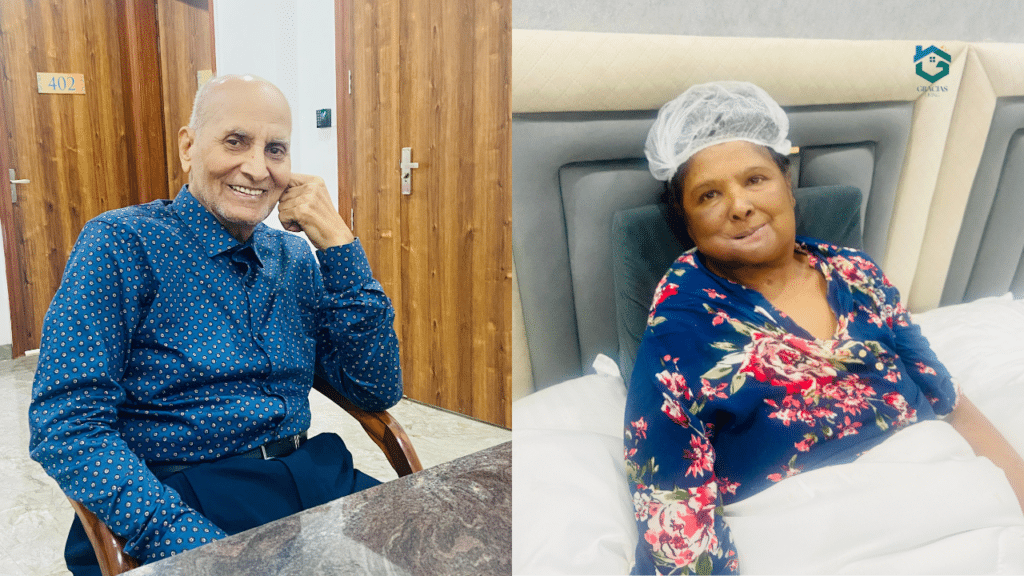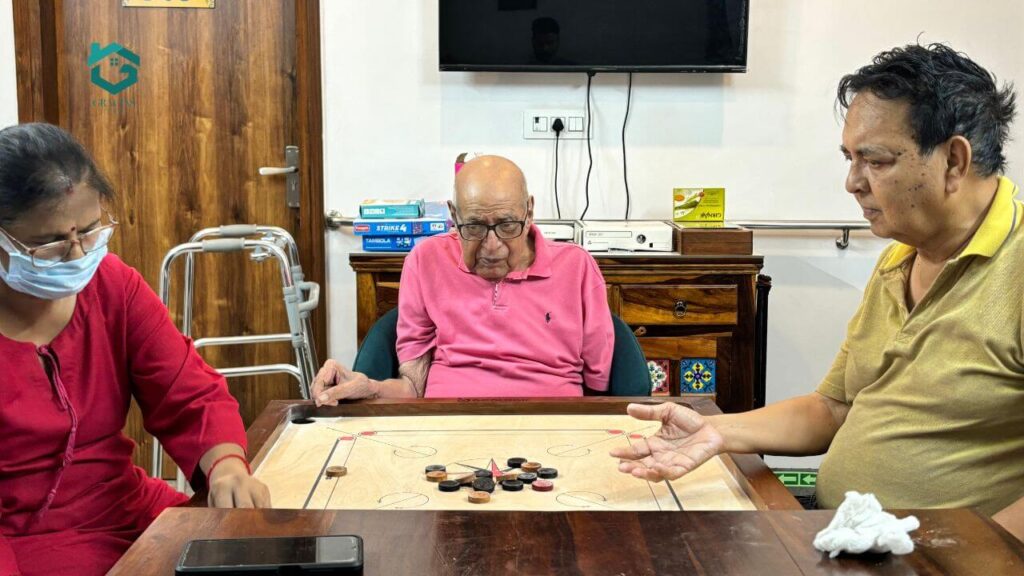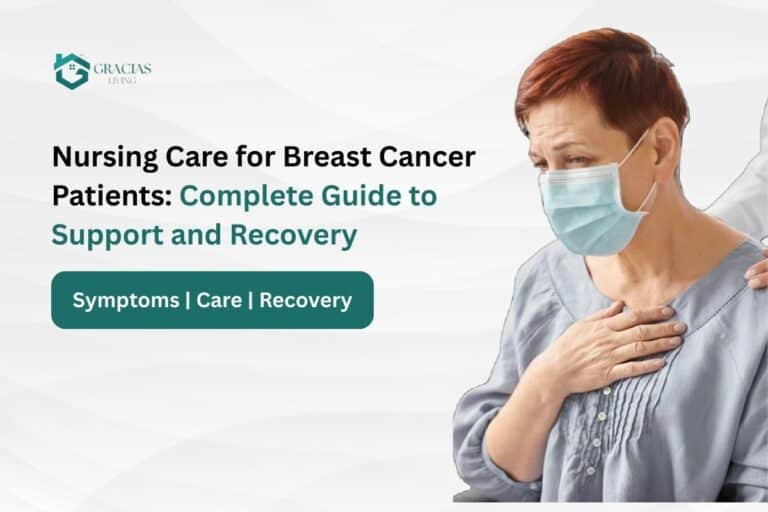Quick Summary of the article:
- Post-surgery recovery is safer and faster at assisted living facilities with 24/7 nursing care.
- Post-surgery recovery improves when seniors receive personalized physiotherapy and mobility support.
- Post-surgery recovery becomes stress-free in a clean, senior-friendly, secure, monitored, and comfortable environment.
- Post-surgery recovery reduces hospital readmissions with expert medication and wound care management.
- Post-surgery recovery at Gracias Living provides the best care to seniors to regain strength, confidence, dignity, and independence.
Post-surgery care is important for senior citizens.
At Gracias Living Assisted Living Facility in Gurgaon, we understand that post-operative care is important for Seniors. The healing journey starts once surgery ends, and the role of Post Surgery Care Centers starts.
While hospitals handle the immediate aftermath of surgery, long-term recovery often requires a specialized environment that emphasizes care, safety, and comfort.
At Gracias Living, we specialise in Post-Surgery Care, and our expert nursing team and rehabilitation Caretakers provide round-the-clock support according to each senior’s needs.
We coordinate everything: medication management, wound care, mobility support, physiotherapy, and emotional well-being.

Gracias Living bridges the gap between hospital discharge and home recovery by offering:
- Personalized post-surgery care plans
- 24/7 skilled nursing support
- In-house physiotherapy sessions
- Nutritious meals to boost healing
A peaceful, hygienic, and fully monitored environment
We help seniors regain strength, mobility, and confidence, safely and comfortably. Our goal is to reduce the risk of complications, prevent hospital readmissions, and support a faster, stress-free recovery.
Whether it’s hip replacement rehabilitation, cardiac surgery recovery, post-stroke care, or Cancer treatment support, you can believe Gracias Living is there to deliver the Best post-surgery recovery Care. We stand by our residents every step of the way.
The Importance of Assisted Living in Post-Surgery Care for Seniors
Seniors face unique challenges during the post-surgery phase, such as slower healing times, existing health issues, reduced mobility, and a higher chance of complications.
Because of this, they need a supportive and supervised environment for recovery. While family members often want to help, many lack the training to provide the care that seniors require.
Assisted living facilities fill this gap by providing 24/7 support from trained professionals. Here are some key aspects of post-surgery care that make these facilities perfect for recovery:
1. Personalized Medical Attention
Post-surgery, seniors need continuous monitoring to manage pain, prevent infections, and address complications like blood clots or respiratory issues.
In an assisted living community, residents receive personalized care plans that cater to their unique recovery needs, such as medication management, wound care, and post-operative therapy.
The care staff works closely with healthcare providers to ensure that the recovery plan is implemented correctly.

2. On-Site Nursing and Therapy Services
Many assisted living facilities offer nursing services on-site to provide immediate medical care when needed. For seniors recovering from surgery, this means help is available 24/7, reducing the risk of complications.
On-site therapists also offer physical, occupational, and speech therapy, depending on the type of surgery and the recovery goals.
Whether it’s regaining strength after a joint replacement or improving balance after a neurological surgery, these services ensure that seniors make steady progress.
3. Pain Management and Medication Assistance
Managing pain effectively is a significant part of post-surgery recovery, but many seniors struggle with administering their medications properly.
Assisted living facilities provide professional staff to monitor medication schedules, ensuring that seniors take the right dosage at the right time.
This minimizes the risk of missed doses or overdoses and helps manage post-surgical discomfort more effectively. In addition, the staff is trained to observe for side effects or complications related to medications and promptly address any issues.
Assisted Living facilities provide a safe and supportive environment
One of the greatest challenges for seniors recovering from surgery at home is the risk of falls or injuries that can set back recovery.
Assisted living facilities are designed with senior safety in mind, offering features such as:
1. Fall Prevention and Mobility Assistance
Post-surgical patients often experience weakness, reduced mobility, and balance issues, increasing the risk of falls.
Assisted living facilities are equipped with handrails, non-slip floors, and other safety measures that reduce this risk.
Additionally, staff members are trained to assist seniors with mobility, whether it’s helping them get out of bed, walk to the bathroom, or participate in therapy sessions. Having support readily available significantly reduces the risk of accidents during the recovery process.
2. Access to Emergency Care
Even with the best care, emergencies can happen, particularly for seniors who may experience unexpected complications.
Assisted living facilities are designed to provide quick access to emergency medical care.
This means that in the event of an issue like a sudden drop in blood pressure, breathing difficulty, or any other complication, help is immediately available, giving residents and their families peace of mind.
3. Nutritional Support for Recovery
Nutrition plays a critical role in post-surgery healing, particularly for seniors who may struggle with appetite or dietary restrictions.
Assisted livingfacilities provide nutritionally balanced meals that support recovery, with an emphasis on vitamins, proteins, and minerals that promote healing.
Customized diets are often created for residents who need specific nutrients or have certain medical conditions. The convenience of having meals prepared also reduces the stress for seniors, allowing them to focus on their recovery.
Assisted living role in emotional and social support during recovery
Surgery and recovery can emotionally tax seniors, who often feel isolated or overwhelmed by the process. Assisted living facilities create a supportive social environment that helps seniors navigate these emotional challenges.
1. Engagement in Social Activities
Socialization is not only crucial for emotional well-being but can also have a positive impact on physical recovery.
Assisted living facilities often have a variety of activities designed to keep residents mentally engaged and physically active, within the limits of their recovery.
Whether it’s participating in light exercise, joining group discussions, or attending recreational events, these activities offer a sense of normalcy and joy, helping seniors recover faster by improving their overall mood and motivation.

2. Emotional Support and Companionship
Assisted living facilities provide a community atmosphere where seniors can interact with staff and fellow residents, offering companionship and emotional support during difficult times.
Knowing they are not alone in their recovery can alleviate feelings of anxiety and depression. Many facilities also offer counseling services or group therapy sessions, which can help seniors cope with the emotional aspects of recovery.
3. Reduced Burden on Family Caregivers
Post-surgical recovery for seniors often places a significant burden on family caregivers, who may struggle to provide the constant care and attention needed.
Assisted living facilities alleviate this stress, allowing family members to focus on emotional support rather than physical care.
Knowing their loved one is in a safe, supportive, and well-equipped environment allows families to feel more at ease, which in turn benefits the senior’s recovery journey.
Structured routine of Assisted Living promotes healing
For seniors recovering from surgery, keeping a structured routine that balances rest, medication, therapy, and nutrition is essential for a smooth recovery.
Assisted living facilities excel at providing this structure, helping seniors stay on track with their recovery plans.
1. Encouragement for Healthy Habits
Assisted living facilities are adept at encouraging seniors to engage in healthy habits that promote recovery.
This can include light exercise, proper hydration, and adhering to their recovery plan. By maintaining a structured environment that fosters good habits, assisted living facilities help seniors recover more efficiently.
2. Routine Medical Checks
Assisted living staff conduct regular health assessments to monitor a senior’s recovery progress.
Whether it’s checking vital signs or assessing wound healing, these routine checks ensure that any issues are caught early and addressed before they become serious.

3. Scheduled Therapy Sessions
Regular physical and occupational therapy is key to regaining mobility and strength after surgery.
Assisted living facilities provide scheduled therapy sessions, ensuring that seniors don’t miss out on essential rehabilitation activities. This structure helps to build strength and regain independence more quickly than an unstructured recovery at home.
Conclusion
Choosing an assisted living facility for post-surgery care offers many benefits for seniors.
These facilities provide personalized medical attention, rehabilitation services, and emotional support that help with healing.
They create a safe and comfortable environment where seniors can focus on regaining their strength while their families feel a sense of relief, knowing their loved ones are receiving compassionate care.
For families seeking the best option after surgery, assisted living offers a holistic approach that nurtures not just physical recovery, but also mental and emotional well-being, reminding everyone that healing happens best in a loving and supportive setting.
Frequently Asked Questions
1. How to care for a postoperative patient?
The provision of postoperative care encompasses the monitoring of vital signs, pain management, infection prevention, and mobility support. Wound care, drug administration and nutrition are also significant. The consistent postoperative visitation with healthcare personnel helps the patient to recover with minimal or no harm to the body.
2. What are the three steps in post-operative care of a patient?
These three steps include immediate care, intermediate care and continuing recovery. Acute treatment is aimed at stabilising the patient after surgery. Interventions such as pain management, wound management, and mobility exercises are part of intermediate care.
3. What is the immediate post-operative care procedure?
Medical personnel observe vital parameters, airway stability, and pain treatment right after surgery. Patients are put under observation because of the possible complications, such as bleeding or infection. Much attention is paid to proper positioning, wound evaluation and hydration to enable the patient to recover safely after anaesthesia.
4. How do nurses monitor recovery after surgery?
Vital signs, wound condition, and pain levels are checked by nurses on a regular basis. They determine the mobility of a patient, his or her ability to eat, and his/her emotional condition. Recording observation and communicating with doctors, they guarantee the early identification of complications.
5. Can post-surgery care help patients with chronic illnesses?
Yes, The post-surgery care is very important to patients with long-term ailments such as diabetes or heart disease. It is concerned with the control of underlying health problems, prevention of complications, and post-surgery recovery based on individual care plans, which are focused on the post-surgical and long-term health requirements.




